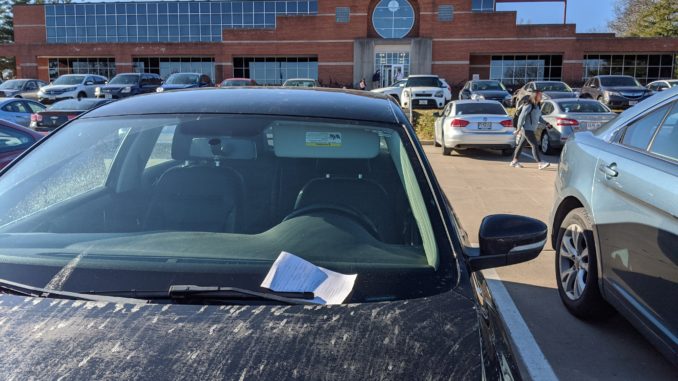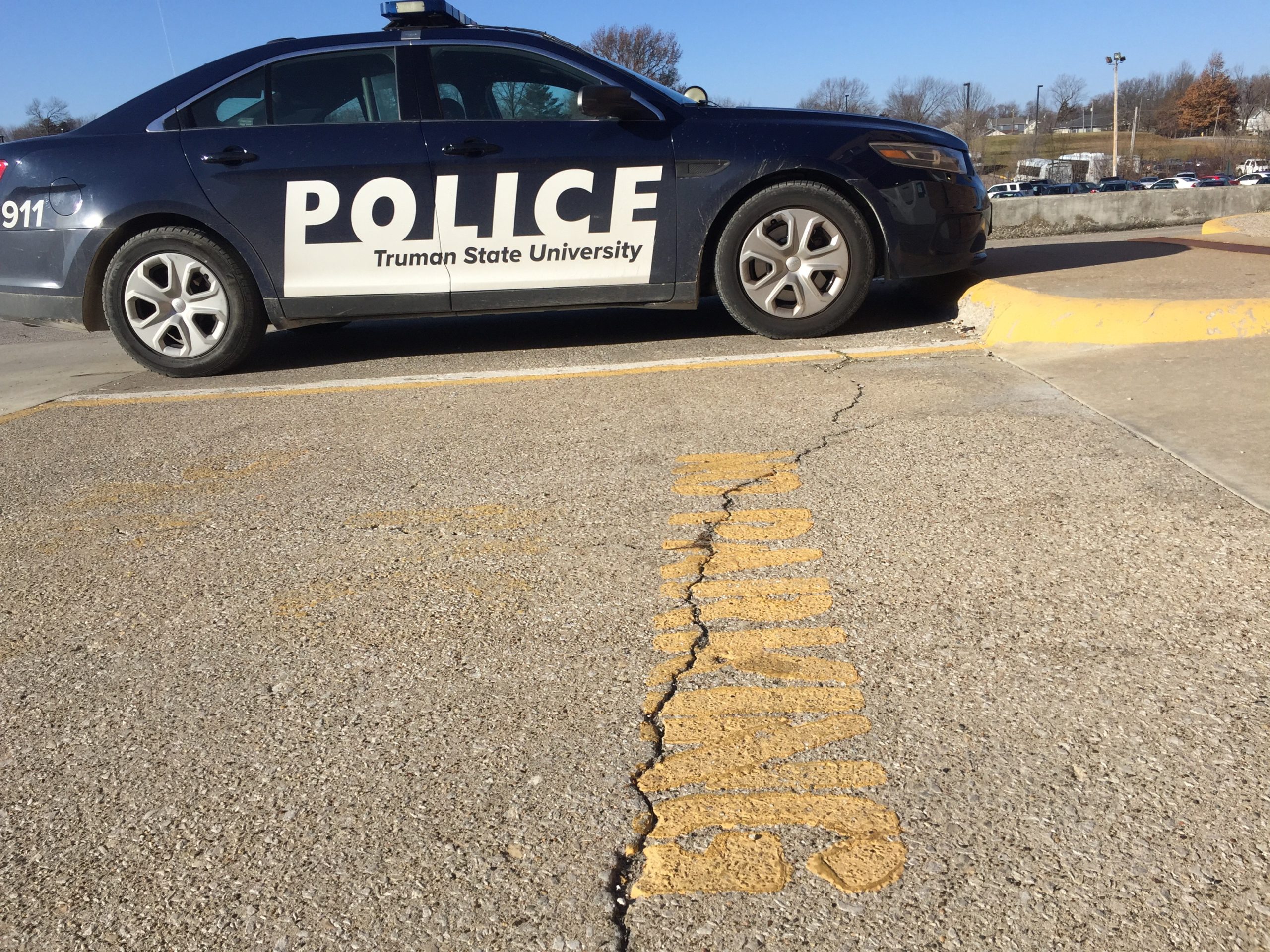
In a recent survey of over 500 Truman State University students, participants expressed frustration with parking near campus and 86.4% believed it is an issue that should be a priority to Truman administration.
A large number of vehicles ticketed combined with the cost of obtaining a parking pass has led students to be concerned with parking close to campus, according to the survey. Chad Whittom, assistant director of the Department of Public Safety, said 2,307 parking passes were sold so far this year: 1,211 green resident passes, 1,043 blue commuter passes and 53 gold park and save passes. In comparison, 2,755 parking passes were sold in the 2018-19 academic year: 1,468 green resident passes, 1,149 blue commuter passes and 111 gold park and save passes.
In an attempt to understand what lots were being used the most, Whittom recorded how full each campus parking lot was on a random day each year. In March of 2019, 75% of campus parking spots were occupied, with the majority being occupied by green decals (51%).
In a survey of 533 Truman students, 64.7% said they find it difficult to find parking close to campus. 60.1% of Truman students feel parking on campus is very important and 86.4% of students find parking to be an issue that should be addressed. Many students expressed frustration with not being able to park close to campus. Additionally, 62% of the students that did not buy a pass chose to opt out because of its high price.
“When you restrict who can park where, then it’s going to make it harder to find spaces [to park],” senior Jared Bloustine said.
Senior Maddy Valencia has a red faculty pass because of her father’s professor status, and said parking is also an issue for her. Valencia said she thinks Truman’s claim that it does not have room to build new parking is unfair because they could replace existing parking lots with parking garages.
“I have been late to so many classes because of parking,” Valencia said. “You think you give yourself plenty of time, and then there’s no spots anywhere. You have to park really far away, and then you have to add another 10 minutes [to] walk.”
Due to limited student parking close to buildings, some students choose to park in lots that do not correspond with their parking pass and risk receiving a parking ticket. Two years ago over 3,049 parking tickets were issued. Last year, that number dropped by over 600. Whittom said the Department of Public Safety tickets vehicles for a variety of things, such as failure to register a vehicle, improper display of a parking pass, parking on sidewalks and not parking within the lines of parking spaces.
Student Government, in accordance with DPS, offers an online ticketing appeal process. Here, students can attempt to either reduce the cost or fully appeal the payment of a parking violation.
Junior Adam Paris serves as the Parking Appeals Committee chair on Student Government’s Student Senate. Paris and his three-person committee have complete control over the appeal process and decide which tickets are denied, reduced or appealed. Every week the committee meets at a different location to discuss anywhere from five to 30 appeals, depending on the week.
“We look over what they did wrong according to the ticket and their reasoning as to why it happened. We uphold the rules quite often,” Paris said.
According to DPS, 159 tickets were ruled on by the appeals committee last semester, as of Nov. 18, 2019. Of these, 79 appeals were denied, 63 were modified or reduced in price and 17 were accepted.
Paris explained that in 2017, Student Government created a temporary ad hoc committee to address qualms with parking on campus. They found that Truman actually has a lot of available parking, just not where and when students want it.
“We tried to address it and we found that Truman doesn’t have enough money to make more parking and to do so they would have to buy out areas that have houses on it. Honestly, with reduced enrollment parking spots are less of an issue this year,” Paris said.
Due to limited options for convenient parking on campus, many students parallel park on side streets. This raises safety concerns and strain on side streets in the city of Kirksville. Glenn Balliew, the city’s public works director, explained that many students are parking illegally on one-way side streets.
“Kirksville is an older town with many roads that were never built to have parking on the streets,” Balliew said.
DPS does not administer off-campus parking tickets. They do enforce all state and city vehicle codes, as well as traffic violations such as expired tags, Whittom said.
“We do try to notify people because we know that people’s tags expire and they don’t realize it and so we try to let them know,” Whittom said.
Once citations are written, the tickets are processed at DPS and then sent to the business office for billing. DPS only manages registration and enforcement of parking on campus, Whittom said.
The income amounted for July 2018 to June 2019 from parking tickets was $63,415. Parking decals last year sold for $130, totaling over $330,000.
Dave Rector, vice president for administration, finance and planning, said Truman doesn’t make a profit off parking tickets but from the parking decals that are sold. The money from the decals is divided into two different budget funds: general education and auxiliary.
The general education budget is the academic budget which pays for faculty and academic buildings, Rector said. He said the auxiliary budget covers residence halls, the Student Union Building and the Student Recreation Center, all of which are not registered for state funding.
The money that’s transferred into the auxiliary pool each year is also used for making repairs, such as parking lot repairs, Rector said.
“The little parking lot between [McClain Hall] and the Student Union [Building] was repaved this last summer,” Rector said. “That was like $75,000 and all that was, was just a top coat of asphalt.”
Truman doesn’t sell as many as blue passes as it used to, Rector said. He said he thinks this is because of the abundance of rental housing close to campus. The last time Truman raised the price of parking passes was two years ago, Rector said.
Other universities face similar complaints from students about parking. Northwest Missouri State University in Maryville, Missouri, is comparable to Truman regarding the number of students and parking spaces available. Northwest, however, has over 1,000 designated “open” parking spots, which allow residents, commuters or faculty to park. The only requirement to park in an open lot is to have a valid parking pass affixed to the vehicle.
Ticketing at Northwest operates similarly to ticketing at Truman, according to Clarence Green, vice president of culture at Northwest. Green said Northwest has several student workers that are charged with ticketing vehicles that are parked incorrectly or in the wrong lot.
“All tickets can be appealed within a specific amount of time,” Green said. “If the appeal is not granted, a second appeal in person with the committee can occur upon request.”
This second appeal is something that Truman’s system does not include. If students at Truman appeal a parking ticket and it is denied, they do not have the opportunity to advocate for themselves in front of the ticket appeals committee.
Missouri State University in Springfield, Missouri, also takes a different approach to parking tickets. The Bear With Me program was implemented in spring 2018 after a Student Government initiative was passed, which allows students to work off one parking ticket per semester through community service. The program uses GivePulse, an online volunteer opportunity database, to provide students with options for their service. Students must complete at least two hours of service to erase one parking ticket. Cole Pruitt, manager of transportation at Missouri State, said that all fines qualify for the program, except tickets given for parking in an accessible space.
“It’s an additional resource for students,” Pruitt said. “The challenge is finding the time to do community service. Our participation increased last year during the 2018-2019 academic year, with just over $4,000 in fines being worked off.”
Pruitt said the Bear With Me program operates on an annual funding allotment, which is currently set at $6,000. If $6,000 of fines are worked off, the program stops and resumes at the beginning of the next academic year.
With the enrollment issues currently facing Truman, it could be time to try a new approach regarding parking. Given the success of other college parking programs, Truman students might benefit from changes to the current ticket appeal process and parking availability.


